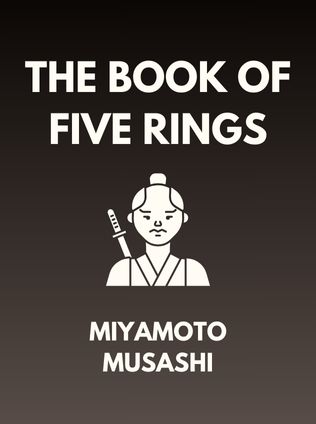
The Book of Five Rings
By Miyamoto Musashi
Published 01/1645
About the Author
Miyamoto Musashi (1584-1645) stands as one of Japan’s most revered Samurai warriors, not only for his unmatched prowess in combat but also for his profound contributions to the philosophy and strategy of the warrior’s way. Born into an era of social upheaval and constant warfare, Musashi's life was forged in the fires of battle. From a young age, he demonstrated exceptional skill with the sword, winning his first duel at the tender age of thirteen. Over the course of his life, Musashi would participate in over sixty duels, emerging victorious each time, a feat that solidified his legendary status in Japanese history.
However, Musashi was more than just a warrior. He was also an artist, a poet, and a philosopher. His writings, particularly The Book of Five Rings, offer deep insights into the nature of conflict, discipline, and personal mastery. Composed in 1645, just weeks before his death, The Book of Five Rings distills a lifetime of combat experience and spiritual reflection into a concise guide that transcends the battlefield, offering wisdom applicable to any area of life where strategy and discipline are key. Musashi's teachings continue to inspire and influence martial artists, business leaders, and anyone seeking mastery in their chosen field.
Main Idea
At its core, The Book of Five Rings is a treatise on strategy and the warrior’s way. Musashi argues that true mastery in any discipline, whether it be swordsmanship, leadership, or life itself, is not attained through brute strength or innate talent but through relentless discipline, adaptability, and an unwavering commitment to continuous learning. The essence of Musashi’s philosophy is the idea that strategy governs all aspects of life, and by understanding the principles of strategy, one can achieve success in any endeavor.
Musashi organizes his teachings into five “books,” each named after one of the natural elements: Ground, Water, Fire, Wind, and the Void. Each book explores different facets of strategy and the warrior’s path, from the fundamentals of martial arts to the spiritual state necessary for true mastery. Although written for the Samurai of 17th-century Japan, Musashi’s principles are timeless, offering valuable insights for modern readers in both their personal and professional lives.
Table of Contents
- The Ground Book: Fundamentals of the Way
- The Water Book: Training Body and Mind
- The Fire Book: Individual and Collective Combat
- The Wind Book: Knowing Your Competitor
- The Book of the Void: Achieving Physical and Mental Harmony
The Ground Book: Fundamentals of the Way
Musashi begins The Book of Five Rings with the Ground Book, where he lays the foundation for his philosophy of strategy. The Ground Book is about understanding the fundamental principles that govern the warrior's way. Musashi emphasizes that before a warrior can effectively engage in combat or apply strategy, they must first thoroughly understand their discipline. This understanding is not superficial; it requires deep, continuous study and the ability to apply knowledge in practical ways.
One of Musashi’s key teachings in this book is the importance of knowing your discipline inside and out. He insists that a warrior must not only learn the techniques and tools of their trade but must also internalize the principles behind them. As Musashi writes:
Sign up for FREE and get access to 1,400+ books summaries.
You May Also Like
The Subtle Art of Not Giving a F*ck
A Counterintuitive Approach to Living a Good Life
By Mark MansonRich Dad Poor Dad
What the Rich Teach Their Kids About Money - That the Poor and Middle Class Do Not!
By Robert T. KiyosakiHow To Win Friends and Influence People
The All-Time Classic Manual Of People Skills
By Dale Carnegie



















